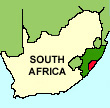INDEX
Stats and Facts
  English English
  Afrikaans Afrikaans
Photo Gallery
Disclaimer
Events
The Book Shop
The Guestbook
About
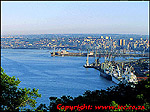

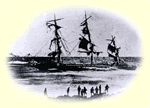 Thanks to Time Traveller for the history photo's. Click on the images for an explaination of the pictures. The site is well worth a visit.
Thanks to Time Traveller for the history photo's. Click on the images for an explaination of the pictures. The site is well worth a visit.


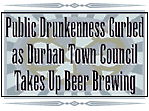
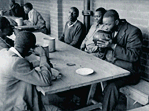




Nelson Mandela and Jacob Zuma at a political rally in Durban in 1994.
|
STATS & FACTS
Accommodation
   Banking
Banking
   Climate
Climate
Communications
   Crime
Crime
   History
History
Language
   People
People
   Photography
Photography
Public Holidays
   Religion
Religion
Accommodation
Durban has the full range of accommodation from total luxury hotels that most cannot afford right down to some really cheap places such as hostels. If you are an overseas traveller and you are spending sterling, dollars or German marks then the prices should be more than reasonable - the South African rand has lost a fair bit of value against the major currencies.
Hotels - Hotels in South Africa have a grading system from five star to one star. Your travel agent should be able to tell you exactly how it functions. The Royal Hotel is one of the top hotels in the world and I believe it has on occasion been listed in the Top 100 of the world. There is the newly constructed Hilton Hotel and of course the Edward Hotel on Durban's Golden Mile. The city has some 18,000 hotel rooms!
Banking and Financial Services
The South African banking system is one of the most modern in the world. All the major banks have all the facilities required to exchange foreign currency. The city is full of ATM's and therefore after hours banking is possible, although visitors are advised to take care when doing this as there are a number of con artists who do card switches etc. The language used in the banks is English. Service fees in the banks have gone up quite considerably in recent years, but for those travelling through with foreign currency, they'll still be very reasonable.
Climate
Durban has a sub-tropical climate. This means that the summers are hot and humid while the winters are mild and pleasant. Because it is located in the Southern hemisphere Christamas is in the summer. Temperatures never go below zero and in fact at the "height of winter" daytime temperatures seldom go below 15 Celcius. The rainy season is in the summer and the winters are relatively dry. Durban has an average of 320 sunny days a year.
Communications
Durban has the full range of communication facilities and South Africa is the most advanced country for telecommunications in Africa. Call boxes generally operate by card and may be a bit sparse. Some pubs and restaurants have call boxes which operate with coins. There are an increasing number of privately operated call centres which offer telephone and fax facilities.
Cellular/Mobile Phones
There are two cellular networks in the country - Vodacom and MTN. Both are usable in the entire area of Durban. There is also, the writer has heard but as yet connot confirm (hi is in Bangkok at the moment) a company which does rent out cell phones for tourists. The government is currently accepting bids for a third licenced mobile phone service. Recently, there have been a number number changes.
Dialing Codes
The international dialing code for South Africa is 27.
The area code for Durban is 31.
When dialing a Durban number from within South Africa then it becomes 031.
When dialing from out side of South Africa then do not use the 0.
Within Durban no dialing code is required.
To dial out from South Africa use 09 followed by the country code. For example when dialing England you would dial: 0944-area code - number.
Area codes for some other cities in South Africa are:
Cape Town 021
Johannesburg 011
Bloemfontein 051
Pietermaritzburg 0331
Pretoria 012
Crime
During the early 1990s crime escalated substantially. During the past two years, though, reports indicate that the crime rate has dropped substantially (although, relative to a place like Switzerland it would still be high), and is now much lower than in Cape Town or Johannesburg. This drop in the crime rate is thanks due in large to the Durban Metro Police's (formerly the Durban City Police) enlargement and increased visibility.
Apart from the Metro Police (run by the city), there is also the nationally-run South African Police.
Tourists are advised not to advertise themselves and should ask locals about their proposed location and the places where they intend to visit. Listen to them. They will give you the best advice. As in any country common sense should prevail.
History
The Bay of Natal, around which Durban is centred, provided refuge for seafarers at least as early as 1685, and it's thought that Vasco da Gama anchored here in 1497. With a good port established at Delagoa Bay now Maputo, Mozambique , Natal Bay attracted little attention from Europeans until 1824 when Henry Fynn and Francis Farewell set up a base here to trade for ivory. By 1835 there was a small town with a mission station, and that year it took the name Durban, after the Cape Colony governor.
In 1837 the Voortrekkers crossed the Drakensberg and founded Pietermaritzburg, 80-km northwest of Durban. The next year, after Durban was evacuated during a Zulu raid, the Boers claimed control, renaming it Port Natal. It was reo-ccupied by a British force later that year, but the Boers stuck by their claim. The British sent troops to Durban but they were defeated at the Battle of Congella in 1842. The Boers retained control for a month until a British frigate arrived and dislodged them.
The next year the whole of Natal was annexed by the British and Durban began its growth as an important colonial port city. In 1860 the first indentured Indian arrived to work the canefieldsand soon many more Indian labourers arrived, including, in 1893, Mohandas Gandhi.
With the discovery of gold in the then South African Republic (Transvaal), Durban grew as prospectors poured into the country. The first railway line in Southern Africa was laid at an area call The Point on Durban's harbour. This railway eventually went all the way to the goldmining areas of the Witwatersrand.
During the Boer War (1899 to 1902), Durban was not directly affected by any action apart from the landing of British troops and equipment on their way to the front.
Durban became a part of the Union of South Africa in 1910 when the colonies of Natal, the Orange Free State, the Transvaal and the Cape Colony joined together. In the ensuing years, various apartheid laws were enacted. A number of forced removals took place as did riots and demonstrations. There were also a number of clashes between blacks and Indians, the most famous of these being the 1949 Durban Riots.
In 1994 South Africa held its first all-race elections. Durban was changed from a white-run city to a multiracially governed city. Subsequently the city's boundaries were expanded and it absorbed various sattelite cities such as KwaMashu, Umhlanga, Pinetown, Westville, Ballito, Pheonix etc.
Language
There are 11 official languages in South Africa. In Durban the main language of business is English and pretty much everybody understands it. A variety of other languages are spoken: Zulu, Afrikaans, Hindi, Arabic, Gujurati, Xhosa. You might encounter people who can speak German, Greek, Italian, Portuguese and French as there are sizable immigrant populations in the city.
People
There is a large mixture of people in Durban. Africans make up the bulk of this with the Zulus being the most dominant. Durban is the also the centre of the Asian community in South Africa, descended from indentured Indian slaves imported into the country to work the surrounding sugar cane fields. Tamils, Hindus, Gujuratis and Moslems are all here. The third largest group are people of European descent, primarily English, with a sizable German, Italian, Portuguese and Jewish communities. The fourth group are the Coloured, those people who are of mixed European and African descent.
A census has not been done in South Africa for quite a while and even if it were done it would be difficult to determine the population. The estimates that the writer has heard of range from 1 million to 5 million, although between 2 and 3 million is probably the most accurate, considering that the population for KwaZulu Natal is usually estimated to be approximately 11 million. The writer believes that the authorities understate the population.
Photography
Still Photography
Durban is a great place to take photographs. But developing them, buying new equipment or getting your camera serviced is has become pretty expensive in the past few years, especially with the fall in value of the local currency, the Rand.
Colour prints are the cheapest. Slides are quite expensive (a German friend of mine told me that it was more expensive than in Germany). There arenít too many places that develop black and white prints. More than likely you will have to wait a couple of days for them to be developed at the big photo shops such as Whysalls or Photo World.
There are several places that do one hour developing. Game City is one place that often offers good prices. For more info, contact the Westville Camera Club (see Clubs and Organisations for details).
Generally photographing people should not be a problem and South Africans usually love to appear before the camera, but the usual courtesies apply. On Durbans beachfont area the ladies selling curios or the Ricksha men will often ask you for about R10,00 to R20,00 to have their photos taken.
Digital Photography and Video
Unfortunately, I have no experience with video cameras or digital photography in Durban and therefore can give no advice. Any Durbanites knowledgeable on the subject and want to help the writer, please e-mail me at stolley@loxinfo.co.th or at stolley@webmail.co.za .
WARNING:
As a tourist donít go flouting your camera or video camera around. A person carrying an object (video camera etc) that is out of the reach of the average person will simply make him or herself a target. Remember the person who robs you is unlikely to use it but sees the potential to sell your equipment and if he/she is desparate it could be a month's worth of living. I have been into townships and everywhere in Durban with my camera and never been affected, but stories of tourists being hit have abounded at times. Police have much more serious things on their plate and are not likely to be very sympathetic to a person whom they feel has made a target of themselves. Please be sensible and then you are unlikely to experience problems.
Public Holidays
January 1 - New Year's Day
March 21 - Human Rights Day (Sharpville Day)
April 13 - Good Friday
April 16 - Easter Monday/Family Day
April 27 - Freedom Day
May 1 - Workers Day
June 16 - Youth Day (formerly Soweto Day)
August 9 - National Women's Day
September 24 - Heritage Day
December 16 - Day of Reconciliation (formerly Day of the Covenant)
December 25 - Christmas Day
December 26 - Day of Goodwill/Boxing Day
Religion
Religious tolerance is the name of the game and just about every religion can be found in the city and there are many places of worship. You can fid Catholics, Hindus, Moslems, Presbytarians, Bhuddists, Lutherans, Hare Krshna devotees, Anglicans and a lot more right through to the traditional Zulu beliefs.
|
